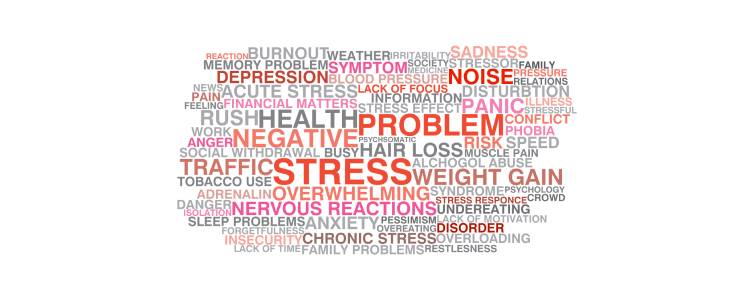Working hard is different from working excessively to the detriment of your relationships and physical health. Everyone who has ever worked a job has experienced some Stress at some point. Even if you love your job, it can still have stressful elements.
Art of Managing Stress at Work
The pressure is not necessarily to meet a challenging obligation but simple things like meeting a deadline. But when the Stress becomes chronic, it can overwhelm and harm both physical as well as emotional health. Unfortunately, long-term success is all too typical and is clear to see in the business world.
Common Reasons for Stress

The mental well-being of an individual plays a vital role in how an individual reacts in a stressful environment. At the same time, some might find a particular situation triggering, while it might not affect some.
People are shaped by their experiences and see the world through the rose-tinted glass perception, which is again created by their set of exposures and experiences.
External Factors that cause Stress:
- Aggressive Behavior from someone
- Sudden loud sound
- Frightening Situations
- Procrastination
- Talking to someone whom you are attracted to /scared from
Common Cause of Stress
The most common examples of Major life-changing events that cause Stress is:
- Financial Issues
- Professional Issues
- Death of a Loved one
- Personal Tragedies
- Parenthood
- Waiting for life-changing results
What causes Stress at Work?

Working in a stressful environment has significant health consequences that range from relatively benign (like minor headaches, colds or flu) to potentially severe (such as metabolic syndrome and heart disease).
Some factors go hand-in-hand when it comes to work-related Stress. Some everyday stressors for the workplace:
- Low Pay
- Excessive workloads
- Lack of social support
- Few opportunities for professional development
- Uninteresting or unchallenging work
- Conflicting demands or unclear performance expectations
- Lack of sufficient control over decisions pertaining to one’s employment.
Effects of uncontrolled Stress at work
Stress doesn’t disappear once you leave your workplace; it persists and sometimes even haunts you in your comfort space. Uncontrolled Stress can take a toll on your mental as well as physical well-being.
Working in a stressful environment can contribute to an unhealthy sleep cycle, mild to throbbing headaches, short temper and difficulty in concentrating.
Types of Stress
There are two types of Stress, and each requires different attention and management.
- Acute Stress
- Chronic Stress
Acute Stress

The more common type of Stress is Acute Stress that people experience. This kind of Stress is short-term and is usually associated with events that happened in the past or will happen in future.
For example, an upcoming deadline or a client meeting. The moment the event is over/resolved, the Stress disappears.
Individuals have good clarity as to the cause and effect of Acute Stress. They will always be known what is stressing them, what the resolution is, how long it will take to get away with it or what the repercussions will be. Acute Stress is a lot easier to deal with, as the individual knows precisely when and how to eliminate Stress.
The effects of Acute Stress can cause Headaches, Bloating, Delayed menstruation cycle in females and more.
However, recurrent acute Stress for an extended period can result in Chronic Stress.
Chronic Stress

It is when Stress has been there for an extended period, and it has more adverse effects than Acute Stress. Chronic Stress is caused when an individual experiences an extended period of Stress or strain.
There are various reasons for Chronic Stress:
- Traumatic or dysfunctional Childhood
- Financial Strain
- Discord Marital Life
- Bad Management at Work or more
People tend to avoid recognizing chronic Stress, which is the primary reason for its adverse effects. As the human body starts to produce high levels of Cortisol (stress hormones in the human body) for an elongated period, it is difficult for the body to go back to normal hormone levels.
The persistent Chronic Stress leads to:
- Bad Immune System
- Diabetes
- Blood Pressure
- Disturbed Sleep Cycle
- Respiratory and Cardiovascular Diseases
- Mental Disorders (like; Anxiety, Depression, Panic Attacks, and PTSD)
If this Stress is left unaddressed or is not treated well can become aggression or severe depression. With the passing of time, unaddressed Stress can become a part of an individual’s personality traits.
High-stress levels are very harmful to individuals, and they might take extreme steps and put their lives in danger. The constant stress stage can even change their personality traits and perhaps their beliefs and make them believe that their actions are justified.
Art Therapy for Stress Management

Even though art therapy is a distinct discipline, you can use self-directed painting to explore your creative side, decompress, and connect with your emotions. As youngsters, most of us had an innate understanding of the power of art. Almost all children like creating objects out of play dough, painting with their hands, or drawing with crayons and other supplies.
Here are some methods for how doing art can reduce stress:
- Acts as a form of self-care
- Helps you tap into a “state of flow”
- Takes your mind off things
How to Handle Stress at Work?

Everyone who has ever worked a job has experienced some Stress at some point. Even if you love your job, it can still have stressful elements.
The pressure is not necessarily to meet a challenging obligation but simple things like meeting a deadline. But when the Stress becomes chronic, it can overwhelm and harm both physical as well as emotional health.
Unfortunately, long-term success is all too typical and is clear to see in the business world.
Common Reasons for Stress
Even though art therapy is a distinct discipline, you can use self-directed painting to explore your creative side, decompress, and connect with your emotions. As youngsters, most of us had an innate understanding of the power of art. Almost all children like creating objects out of play dough, painting with their hands, or drawing with crayons and other supplies.
Here are some methods for how doing art can reduce stress:
- Acts as a form of self-care
- Helps you tap into a “state of flow”
- Takes your mind off things
How to Handle Stress at Work?
While Stress at work is expected, finding a low-stress job is difficult, if not impossible. A more realistic approach is an effective coping mechanism to learn how to handle Stress at work. Individuals can take steps to manage Stress at work by sticking to a positive morning routine, getting clear on requirements at work, and adopting smarter techniques for time management.
Art of Managing Stress at Work
1. Track your Stressors
Record your ideas, information, and emotions regarding the situation, including the individuals and circumstances involved, the surroundings, and your response. Keep a journal, track all the above situations, and check how you respond to stress. Taking notes can help individuals figure out patterns and their reactions to them.
2. Develop Healthy Responses
Fighting Stress with alcohol and unhealthy food is an easy attempt to fight Stress, but choosing healthy options when the tension rises is making an ideal path for recovery. Getting enough sleep is also essential for effective stress management. By refraining from afternoon coffee and limiting stimulating night-time activities like watching TV and using the computer, you can develop healthy sleep patterns.
3. Establish Boundaries
In today’s world, it isn’t easy to establish boundaries as anyone and everyone can approach anyone and everyone on their handheld devices. The pressure to be available 24/7 is real. This constant Stress to be always available makes it necessary to establish a work-life balance and create essential boundaries. This might mean not checking your work emails after your working hours are over or not answering your phone once you leave the office. Even though everyone has a varied taste for the degree to which they integrate their work and personal lives, setting up some distinct separations between the two can help to lessen the likelihood of stress-inducing work-life conflicts.
4. Take Time to Recharge
Don’t invest all your time in working; you are a human being, not a robot. As a human, we don’t only need time to recharge ourselves physically but mentally and emotionally. Take time out for yourself and your loved ones. Leverage the time when you are on off. Take time off whenever you can to unwind and rest so that you can return to work revitalized and prepared to give your best effort. When you can’t take a break, lift yourself by putting your phone away and concentrating on anything else for a while.
5. Learn to Relax
Techniques for reducing stress include deep breathing exercises, meditation, and mindfulness (a condition in which you actively analyse current feelings and ideas without passing judgement on them). Spend a few minutes each day focusing on something simple, like breathing, moving, or eating. With practise, you’ll develop a more robust capacity to focus intensively on one item while avoiding distractions, and you’ll find that you can apply it in a number of scenarios in your life.
6. Talk to your Supervisor
Since productivity at work and employee health has been linked, your manager has the incentive to foster a culture that values employee well-being. Start by having an open dialogue with your employer. This isn’t meant to be a complaint list; instead, it’s meant to assist you in creating a plan for efficiently managing the stressors you’ve discovered so you may give your all at work.
7. Get Some Support
Accepting assistance from trustworthy friends and family members might help you better manage Stress. Additionally, your employer might offer stress management tools through an employee support programme, such as online resources, accessible counselling, and, if necessary, referrals to mental health professionals. Consider consulting a psychologist if you continue to feel overburdened by work stress. They can assist you in better managing stress and modifying lousy behaviour.
Melnick says, 60,000 ideas pass through your head each day, and stress from within is just as likely to affect you as it is from outside factors. The remedy? Try motivating yourself instead of being harsh and judgmental of yourself. Positive thinking will inspire you to succeed and ultimately prepare you to motivate others.
Art Of Managing Stress At Work FAQs
Q1. How do you effectively manage stress at work?
A1. Avoiding stress at work is nearly impossible, so one should learn how to manage it. The best way to manage stress at work is to find your coping mechanism and adopt smarter ways to manage time.
Q2. What are the types of stress?
A2. There are two types of stress: Acute Stress: This is the more commonly found stress in people. Acute stress is supposed to disappear with time, but extended acute stress can lead to chronic stress.
Q3. How can I manage my stress skills?
A3. In modern times, stress has become a commonly found concept and learning how to manage stress is now more crucial than ever. The best way to deal with something is to first get to its roots and then find your way out.


